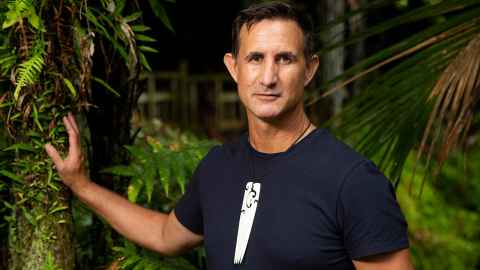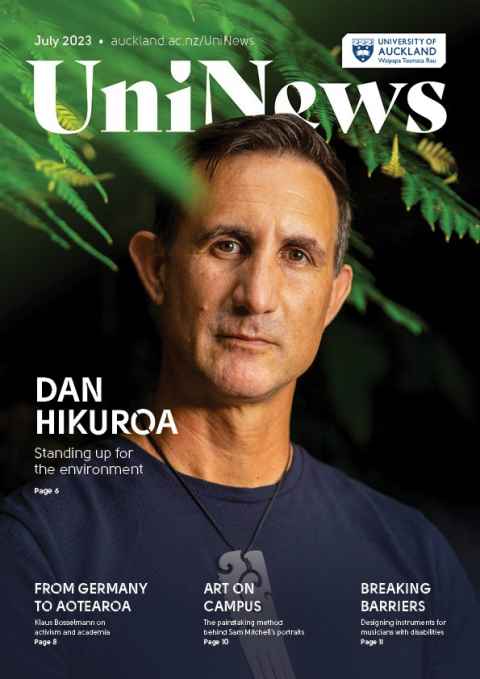Dan Hikuroa: in tune with the natural world
1 July 2023
Associate Professor Dan Hikuroa is working to overcome our biggest environmental challenges by weaving science with Indigenous knowledge.

As Matariki rises this month, you’ll likely find Associate Professor Dan Hikuroa up before the sun, welcoming her and her whānau to our skies.
It’s a special time for Māori that not only symbolises new beginnings but is also a time for reflection, to farewell those who passed in the last year, and for vocalising aspirations.
“Matariki, or the star Puanga for some, is important as it signals that the shortest day has passed and serves as a way to recalibrate the māramataka (Māori lunar calendar),” says Dan (Ngāti Maniapoto, Waikato-Tainui, Ngati Whanaunga, Pākehā).
This astrological event, in which the Matariki cluster of stars reappears in our night skies, plays an integral role in how he plans for the year ahead.
Dan, whose PhD is in geology, is an earth systems scientist in Māori Studies in the Faculty of Arts, who uses a kaupapa Māori approach in much of his research. Mātauranga Māori and science are woven into his teaching and research every step of the way.
“It’s a way I can engage with my tūpuna (ancestors) and their understanding of the world. It’s also a way to engage with my uri (descendants), including those who are yet to come,” he says.
An expert on climate change, Dan is the Culture Commissioner on the UNESCO New Zealand National Commission.
He is best known for his research into the state of Aotearoa’s rivers and is working on a Marsden Project ‘Let the River Speak’, with students and others from the University including Distinguished Professor Dame Anne Salmond, Professor Gary Brierley from the School of Environment and Dr Billie Lythberg from the Business School.
He says it’s time to pay urgent attention to our rivers, catchments and river catchment communities.
“If not now, then when? Cyclone Gabrielle showed us the deleterious impacts of land use and river management decisions based on flawed understandings of how earth systems operate.
“Our decisions have led to the drowning, erosion or burial of homes, marae, bridges and urupa, with sediment suffocating and slash smashing our rivers, estuaries and beaches,” he says.
“We still have 19th-century thinking where the idea that ‘the solution to pollution is dilution’ still underpins some approaches.
“Our rivers are at a breaking point. The best thing we can do to save them is to hear their voice and listen to them. They have been yelling at us for a while now, but particularly loudly in January and February.”
Growing up, the societal cues I picked up were that being Māori meant something not so good. We were expected to be thieves, naughty, or to be great at sport. I didn’t fit those stereotypes.
Dan is enthusiastic about the University’s strategy Taumata Teitei and the way the University is headed.
“It recognises the value of mātauranga in a place of high learning, genuinely grounded in place,” he says.
His work demonstrates how mātauranga and tikanga can contribute too.
“A responsible approach to tackling the many challenges we face is to draw from all available knowledge and practice,” he says.
“We should be exploring both the differences and similarities between the two schools of thought and celebrating that. Innovation lies right at the interface.”
One example is the māramataka which has long been embraced by Māori and Pākehā alike as being an accurate guide to the best times to fish.
But Dan says māramataka can do much more than that. It is an Indigenous system of attuning with the environment and in te ao Māori has a significant role in modern health and well-being.
He says colonial views, embedded in the current ways of thinking, reflect an extractive relationship with the natural environment, seeing it as a resource to be exploited.
In a recent study, he collaborated with Dr Tara McAllister (Te Herenga Waka) and Associate Professor Cate Macinnis-Ng (Biological Sciences) to explore the differences between the concepts of kaitiakitanga (te ao Māori) and Western conservation philosophies and practices.
In Connecting Science to Indigenous Knowledge: Kaitiakitanga, Conservation and Resource Management, Dan says Western conservationists seek to manage nature whereas, using kaitiakitanga, Māori manage their relationship with the environment.
He writes: “One of the major dichotomies between values and concepts from te ao Māori, like kaitiakitanga, and the Western conservation ethic stems from Māori being part of the environment, whereas from a conservation perspective there is a different connection between people and land.Rather than descending from the land and being an intrinsic part of it as Māori are, a Western approach to conservation works to remedy the effects of commodifying the land.
“The intimately bound relationship between Māori and the environment is exemplified through kupu Māori (Māori words) with dual meanings. For example, whenua is a common name for the earth or land, but it also means placenta.”
Our rivers are at a breaking point. The best thing we can do to save them is to hear their voice and listen to them. They have been yelling at us for a while now, but particularly loudly in January and February.
He says the impacts of natural disasters related to the severe flooding this year show us that the land is in urgent need of kaitiakitanga.
But Dan realises many people, even Māori, might not have had the opportunity to be connected to te ao Māori and tikanga. He only explored these Indigenous concepts himself as an adult and says he still has much to learn.
He was raised in Glenfield on the North Shore, where he says he grew up “effectively Pākehā”.
“I didn’t know any Mātauranga. Although I knew I was Māori, I wasn’t immersed in te ao Māori,” he says.
“Growing up, the societal cues I picked up were that being Māori meant something not so good. We were expected to be thieves, naughty, or to be great at sport. I didn’t fit those stereotypes. On reflection, it was a very confusing time.”
But he did notice his love for the natural world and a desire to know it from an early age. When his whānau went to the beach together, he was most interested in exploring rock pools or snorkelling, or filling his pockets with driftwood, shells, or rocks.
“I’d go to the beach with whānau and we’d do regular stuff like throwing the ball, but the curiosity to observe the world around me intrigued me more.
“Learning became my love, especially the environmental side. That curiosity has always been in me, and science was a tool to make sense of that.
He is a father of two daughters and says things are different for them with te reo Māori and Aotearoa New Zealand history being part of their schooling.
“It’s important that my girls know who they are and where they come from. It’s been special to see them grow into that in their individual ways.”
Dan says while doing his PhD he was “quite Pākehā” in his approach.
“I was a scientist who happened to be Māori.”
Then, in 2003, while undertaking his doctoral research, he was offered a role at Te Whare Wānanga o Awanuiārangi in Whakatāne to teach a geology course, which he did for three years.
“It was unique because they asked me to weave mātauranga Māori into it, and I wasn’t quite clear as to what that meant or what it could even look like.
“I had some very generous leaders and a lot of tautoko (support) from kaumātua Wiremu Tāwhai, Brett Stephenson [Auckland alumnus and marine biologist] and Professor Graham Smith.”
After completing his PhD, Dan took a position at the Institute of Earth Science and Engineering, where he worked with Māori communities to help realise dreams and solve challenges.
Although capable of delivering a whaikorero and performing karakia, Dan describes his reo as “intermediate at best”. But he says he is on his journey to improve and has learnt te reo Māori by placing himself in situations where it was required. One of those roles was teaching in Whakatāne, and another was as research director of Ngā Pae o te Māramatanga from 2011-2016.
And when Dan isn’t researching the health of our waterways or teaching, he is always drawn to the water. He developed a passion for surfing and boogie-boarding when he was on an exchange in Tahiti.
“I’m hoping to return to Tahiti this year to learn from the Teahupo’o community, Tahiti’s most popular surfing spot. They are partners in the ‘Let the River Speak’ research project, and we will explore the current rāhui (restriction on fishing) on Teahupo’o.
“I love paddle-boarding and surfing. I most frequently surf at Orewa, but one of the best spots for me is Ocean Beach in Whāngarei. I’d love to be able to surf in Indonesia someday.”
Story by Te Rina Triponel

This story first appeared in the July 2023 edition of UniNews.